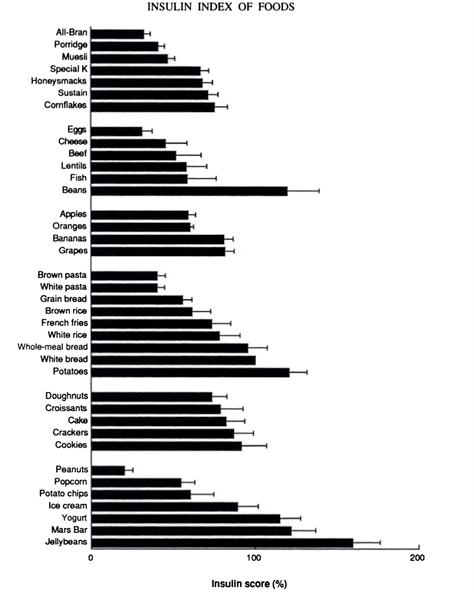shepherdgirl
Member
- Joined
- Dec 7, 2015
- Messages
- 709
Are measurements of the effect of different proteins on blood sugar available? The glycemic indices all serm to completely ignore protein, saying it has a "negligible" effect.
Follow along with the video below to see how to install our site as a web app on your home screen.
Note: This feature may not be available in some browsers.
Click Here if you want to upgrade your account
If you were able to post but cannot do so now, send an email to admin at raypeatforum dot com and include your username and we will fix that right up for you.
My understanding is that proteins can't have a glycemic index value because they lower blood sugar. Since GI is a relative ranking, I don't think it can express a loss in blood sugar, only relative gains in blood sugar. So that would mean that anything that lowers blood sugar by any amount has a GI of zero, which could easily be taken(incorrectly) to mean that a) proteins do nothing to blood sugar, and b)they all have the same exact action on blood sugar-zero. I think that the insulin index, on the other hand, does give a relative comparison for proteins.The Glycemic Index (GI) is a relative ranking of carbohydrate in foods according to how they affect blood glucose levels.
This is not correct, protein foods do not lower blood sugar. They do raise it, just not as much as carbohydrates do. This graph from the article you linked to shows some comparisons:My understanding is that proteins can't have a glycemic index value because they lower blood sugar.

-Ray Peat, from "Glycemia, starch, and sugar in context"Rather than the sustained hyperglycemia which is measured for determining the glycemic index, I think the “diabetogenic” or “carcinogenic” action of starch has to do with the stress reaction that follows the intense stimulation of insulin release. This is most easily seen after a large amount of protein is eaten. Insulin is secreted in response to the amino acids, and besides stimulating cells to take up the amino acids and convert them into protein, the insulin also lowers the blood sugar. This decrease in blood sugar stimulates the formation of many hormones, including cortisol, and under the influence of cortisol both sugar and fat are produced by the breakdown of proteins, including those already forming the tissues of the body. At the same time, adrenalin and several other hormones are causing free fatty acids to appear in the blood.
See this link, meat and fish paragraph.Are measurements of the effect of different proteins on blood sugar available? The glycemic indices all serm to completely ignore protein, saying it has a "negligible" effect.
Thanks @artemis and @LucH for your answers - still looking into the refs you provided.This is not correct, protein foods do not lower blood sugar. They do raise it, just not as much as carbohydrates do.
-Worker Bee, "Reader Response: Insulin Index"While Holt and her co-authors found a high correlation between glycemic index and insulin index measurements, they stumbled upon an intriguing exception. High protein, virtually no-carb foods like meat and eggs, while low on the glycemic index, measured high on the insulin index. In other words, while the meat and eggs didn’t cause a spike in blood sugar the way moist carbohydrates do, they did result in an unexpectedly significant rise in insulin.
The protein doesn't lower the blood sugar directly, it's the release of insulin that lowers the blood sugar. Not sure what you mean by "raising blood sugar again," or "bring the sugar back up." That's not a thing -- the food raises the blood sugar, then insulin lowers it. After that time, the food is well downstream in the digestive tract, it doesn't bring the sugar back up.
There is carbohydrate in muscle tissue cells, in the form of glycogen, which is the storage form of carbohydrate.
I like Marty Kendall but I have a hard time listening to his videos because of the way he pronounces the word "insulin." He says it like "inch-lin," it drives me crazy!
You started by saying, in your first post : "They do raise blood sugar". Then you retract yourself and tell us, oh no they don't lower blood sugar directly, it's the following insulin release that does. Please don't confuse people with bad knowledge.